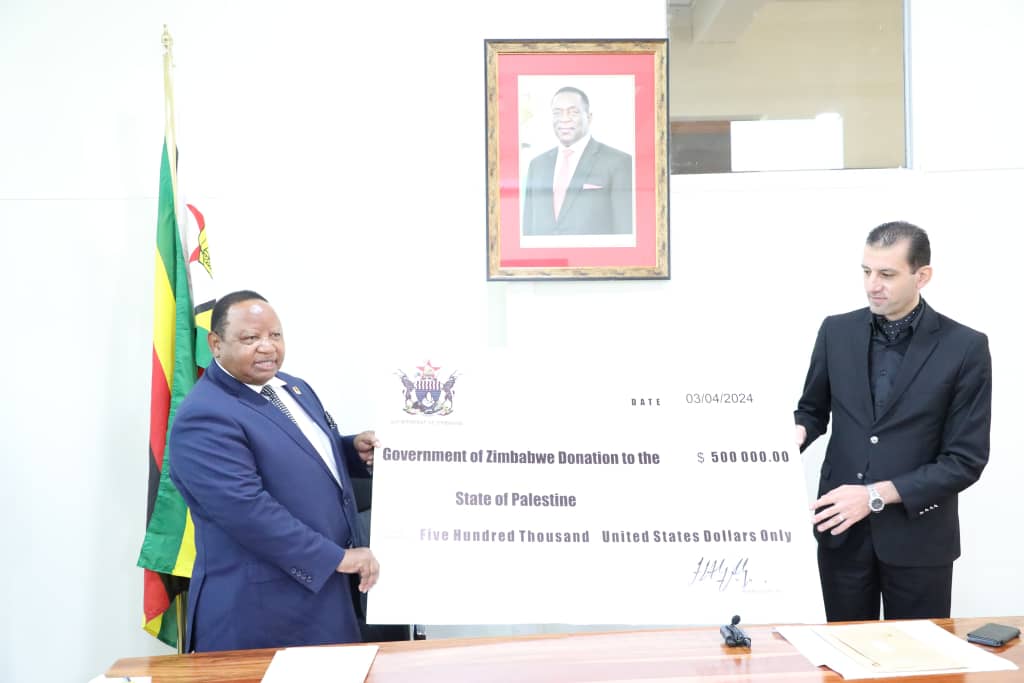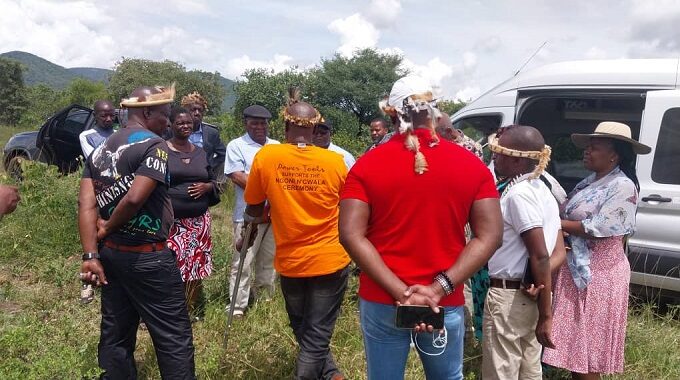Vice-President Emmerson Mnangagwa, who is seen as the most likely successor to President Robert Mugabe, offers the best prospects for a stable transition out of Zimbabwe’s economic crisis but he probably has to work with the opposition and civil society, a British think-tank, Chatham House, says.

In its report entitled: The Domestic and External Implications of Zimbabwe’s Economic Reform and Re-engagement Agenda released this month, the think-tank says Mnangagwa is already working with Finance Minister Patrick Chinamasa and Central Bank governor John Mangudya on re-engagement with the International Financial Institutions so the expectation is that he would continue on this pathway.
“He is seen as possibly offering the best prospects for a stable transition out of the economic crisis, provided he works with others in opposition and civil society. However, he is not widely popular, and has a difficult legacy associated with Gukurahundi,” it says.
But he has some strong points.
“Mnangagwa has strong liberation war credentials, and has forged close links with the military and the War Veterans. He could be pivotal in trying to heal the emerging divide between the War Veterans and their patron Mugabe,” the report says.
“But there are no guarantees that Mnangagwa will succeed; and if he were to come to power his economic policy choices would likely be constrained by continued ideological and political power struggles within ZANU-PF. The political fate of Mnangagwa’s predecessor, Joice Mujuru, within the party’s intricate internal politics serves as a salutary reminder that no one in ZANU-PF is assured the party leadership after Mugabe.”
Below is an excerpt on the political threats Zimbabwe is facing, especially within the ruling Zimbabwe African National Union-Patriotic Front.
Political Threats
Zimbabwe’s political landscape has become more fractious and factionalized since ZANU-PF’s victory in the contentious 2013 presidential and legislative elections. The defeated opposition has subsequently splintered, and as a result many in ZANU-PF feel that the party no longer faces the existential threat that once united it. The party – and the government – can no longer blame the domestic opposition or the West for the state of Zimbabwe’s economy. Additionally, although the powerful legacy of ‘Chimurenga [Struggle] solidarity’ continues to serve as a unifying factor, the weakening of the opposition and the heightened internal succession issue, along with intergenerational cleavages, has made party unity ever more fragile – and its internal politics more volatile. ZANU-PF as both a political party and a government has begun a transition to the anticipated post-Mugabe era, but the form this will take is yet to be seen. The politicization of the state apparatus has not as yet had a catastrophic impact on its effectiveness. But there are concerns that as cracks in the party widen, the state will become dysfunctional and fracture along the lines of civil servants’ and security officials’ factional loyalties.
Meanwhile, however, even in a context of severe economic constraints – and despite some overlaps between party and government issues – the government continues to function, and is supported by a professional, albeit eroded, civil service. There is still an operational distinction between party and government, and the divisions in the party have not fully replicated themselves across the state.
Zimbabwe’s institutional capacity is fairly robust. Parliament remains an important nexus for bipartisan debate and scrutiny of elected officials. Despite its reputation as a rubber-stamp body, parliament has since 2009 – and particularly since 2014 – shown itself to be an institution where there is serious scrutiny of government policy by both opposition and ZANU-PF legislators. Cross-party portfolio committees, such as the finance and economic development committee, play an important role in holding the government to account. In June 2016, notably, RBZ Governor John Mangudya was robustly cross-examined by the committee regarding central bank policy, especially the planned introduction of the new bond notes.109
ZANU-PF
At 92, Robert Mugabe remains the dominant force within ZANU-PF, and while he has tacitly endorsed the reform agenda, and has supported those leading it, investors often see his rhetoric as ambiguous. As uncertainty increases concerning the ageing president’s state of health, the lack of a designated successor means that a political crisis may be on the horizon. Succession is off-limits in official ZANU-PF discourse, and few within the party’s ranks have dared to raise the issue openly.
The result has been a descent into factionalism, as different groups vie for post-Mugabe control. A notable outcome of the rivalry hitherto has been the purging from the party of the former vice-president Joice Mujuru and her followers. Attempts to attract investors are hampered by the lack of apparent planning for Zimbabwe’s post-Mugabe political leadership, and a prolonged succession battle could be extremely risky, not just for the party, but also for the country.
Intra-party factionalism threatens the country’s economic reform process, and has opened deep ideological schisms within ZANU-PF. Vice-President Emmerson Mnangagwa is seen by many as a likely successor to Mugabe; he is working with finance minister Chinamasa and RBZ Governor Mangudya on IFI re-engagement, so the expectation is that he would continue on this pathway.
He is seen as possibly offering the best prospects for a stable transition out of the economic crisis, provided he works with others in opposition and civil society. However, he is not widely popular, and has a difficult legacy associated with Gukurahundi. Mnangagwa has strong liberation war credentials, and has forged close links with the military and the War Veterans. He could be pivotal in trying to heal the emerging divide between the War Veterans and their patron Mugabe. But there are no guarantees that Mnangagwa will succeed; and if he were to come to power his economic policy choices would likely be constrained by continued ideological and political power struggles within ZANU-PF. The political fate of Mnangagwa’s predecessor, Joice Mujuru, within the party’s intricate internal politics serves as a salutary reminder that no one in ZANU-PF is assured the party leadership after Mugabe.
Reform and re-engagement are seen as being irrelevant to millions of Zimbabweans who, struggling for daily subsistence, have been forced into classic short-termism.
There are practical incentives for many party members to support reform. ZANU-PF officials have a strong presence in the business sector, and have a vested interest in promoting reforms likely to produce an improved commercial environment. Those driving the reform agenda also have developed business interests. But the reform process has many critics within the party. Some within the ‘G40’ group see the reform agenda as a Western-inspired process that undermines Zimbabwe’s sovereignty. Not all members of the G40 are opposed to reform and re-engagement, but there are concerns from significant constituencies within ZANU-PF about where economic reform ends and where political reform begins. Some fear that economic reform could ultimately trigger a political power shift. The narrative of a ‘Western agenda’ resonates strongly within the party, and especially among grassroots supporters. Outside the party, many Zimbabweans perceive the reform process as an elite transaction between Zimbabwe (i.e. the government) and its global creditors. Reform and re-engagement are, furthermore, also seen as being irrelevant to millions of Zimbabweans who, struggling for daily subsistence, have been forced into classic short-termism.
Other hardliners within the party are sceptical of economic liberalization and re-engagement, particularly with the Bretton Woods institutions, as they fear this will mean the end of ZANUPF’s historical ideological objective to create a de facto one-party socialist state with a ‘captive’ or ‘token’ opposition.
Attempts to contain and manage factionalism, including tacit endorsement for the ending of factional purges, have not been successful. Although his power and prestige have seen some attrition in recent years, the president remains the dominant controlling force of both party and government, and will have a role to play in efforts to unify the party and win back disaffected constituents ahead of the elections due in 2018. The so-called ‘Million Man March’ in support of Mugabe in Harare in May 2016, and assertions of loyalty to him by the ZANU-PF Youth League, Women’s League, some War Veterans organizations, the military and other key stakeholders, have all served to reinforce Mugabe’s status as an icon within the party. This makes it harder for any internal challengers to gain traction, particularly with national elections on the horizon. Zanu-PF is faced with a dilemma. On the one hand, Mugabe’s age and state of health makes the succession question increasingly unavoidable. For instance, in 2015 the Women’s League pushed for the re-establishment of a woman in the party presidium prior to the annual ZANU-PF conference, as part of the succession matrix, and for the conference to be elective. This was, and remains, contentious; but these and other succession-related issues may be raised again at the December 2016 conference. On the other hand, Mugabe, despite increased such challenges, remains the most authoritative figure within the party and government, and is the ‘glue’ holding together an increasingly fractious ZANU-PF. It is not clear whether, and to what extent, any successor to Mugabe could rebuild party unity.
Mugabe has a symbolic and executive role in unifying and managing often competing interest groups within and between the party, the security sector and the War Veterans. But the formalization and deepening of alliances between these three institutions over the past decade has been weakened by internal disputes. Reports that the Zimbabwe National Liberation War Veterans Association (ZNLWVA) had been advocating for a Mnangagwa succession brought a fierce response from Mugabe, who warned that the War Veterans should not to behave like ‘dissidents’. The subsequent rupture between the President and the ZNLWVA became public in July 2016, when the ZNLWVA executive issued a press statement – termed the Raylton Declaration, after the sports club in Harare at which the meeting took place – announcing that the War Veterans would no longer support Mugabe. Although other ex-combatants’ organizations have maintained their support for Mugabe, the ZNLWVA is probably the largest and best known. While there are clearly divisions within this community, the possibility that a significant proportion of War Veterans may not vote for Mugabe or for ZANU-PF in 2018, and could instead become part of a broader opposition alliance, is one of the most significant challenges to both president and party in recent years. There is likely to be an extraordinary congress of the ZNLWVA before the end of 2016, and whether the association will re-elect its current leadership or bring in fresh, pro-Mugabe leaders remains to be seen. What does seem clear, however, is that the War Veterans’ support for ZANU-PF is no longer guaranteed.








1 Comment